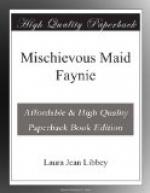“For my sake,” she added, “Mr. Armstrong has promised to let you go free, providing you go with me.”
“It is false!” shouted Kendale. “All you say is a lie, woman!”
“The man who accompanied us to the altar a year ago is here,” he said. “He has with him my marriage certificate,” pointing toward some one on the threshold, adding, “come forward, please.”
And Halloran, who had left a sickbed to accompany her, came slowly forward.
“So you are against me, too!” cried Kendale. “Then all is up, indeed. I acknowledge that all that has been said is true. I had a few weeks of a gay, merry life, and I’m not sorry, either. Come, Gertrude!”
And without a backward glance they slowly left the Fairfax mansion.
The reuniting of Faynie and her lover was extremely affecting, and within an hour a minister was called in who made them one forevermore.
Mrs. Fairfax and her daughter were offered a home for life, but they chose to leave the following day. Faynie and Lester had gone through many thrilling experiences, but were happily reunited—at last.
The end.
No. 1113 of the new Eagle series, entitled “In Love’s Name,” by Emma Garrison Jones, is a story that tells of a romance that, after many sufferings, ends in a happy marriage feast.
Have you read
Love Story
Magazine
?
If not, you have a treat in store for you.
Love story Magazine is devoted to the publication of clean, wholesome romances.
Love story Magazine is developing a staff of writers each of which is destined to become famous.
Love story Magazine is really so good that it deserves your immediate investigation—that is, if you like a good love story.
* * * * *
PRICE 15 CENTS
Published Semimonthly
* * * * *
A Street & Smith Publication
GARVICE
The Love-Story King
* * * * *
Look up the books by Charles Garvice, in the New Eagle Series. There are many of them, but not a dull one in the lot.
So, if you want a splendid love story with a dash of adventure interwoven, investigate the works of Charles Garvice, the king of love-story writers.
Novels by unknown authors are virtually foisted upon the public by certain book publishers. If the books succeed, the public pays; if not, the publisher does and tries all over again.
Why take a chance of getting two cents’ worth of reading for two dollars, when you can get two dollars’ worth for twenty cents, every time, without risk?




